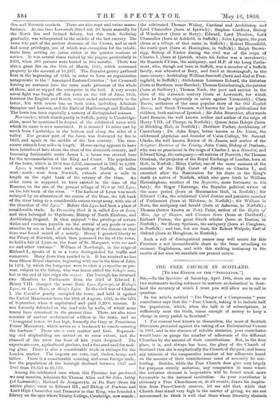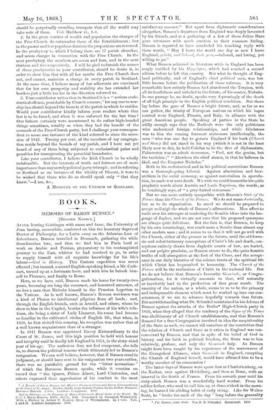THE FREE CHURCH IN SCOTLAND.
[To THE EDITOR OF THE " SPECTATOR."]
SIR,—In the Spectator of Saturday, April 18th, there are one or two statements having reference to matters ecclesiastical in Scot- land the accuracy of which I trust you will allow me to call in question.
In the article entitled " The Danger of a Compromise " your contributor says that the " Free Church, taking it to include half the population, which, when the talk is of subscriptions, is sufficiently near the truth, raises enough of money to keep a charge in every parish in Scotland."
1. For reasons best known to themselves, the mass of Scottish Dissenters protested against the taking of an Ecclesiastical Census in 1861, and in the absence of reliable statistics, your contributor would have us gauge the number of adherents of the different Churches by the amount of their contributions. But, in the first place, it is, and always has been, the glory of the Church of Scotland that she is emphatically the Church of the poor, and hence any estimate of the comparative number of her adherents based on the amount of their contributions must of necessity be mis- leading. Besides, while the Free Church does give very largely for purposes strictly sectarian, any comparison in cases where the sectarian element is inoperative will be found much more favourable to the national institution. As your contributor is obviously a Free Churchman or, at all events, draws his inspira- tion from Free-Church sources, let me add that, while that Church does stand very high in the matter of giving, we are not accustomed to think it well that those whose liberality abounds should be perpetually sounding trumpets that all the world may take note of them. Vide Matthew vi., 1-4.
2. In the great centres of wealth and population the charges of the Free Church do outnumber those of the Establishment ; but in the poorer and less populous districts the proportions are reversed. In the presbytery to which I belong there are 17 parish churches, and seven charges in connection with the Free Church. In the next presbytery the numbers are seven and four, and in the next thirteen and five respectively. I will be glad to furnish the names of these presbyteries to your contributor, should he desire it, in order to show him that with all her merits the Free Church does not, and cannot, maintain a charge in every parish in Scotland. At the same time, I believe many of her adherents are convinced that for her own prosperity and stability she has extended her borders just a little too far in the direction referred to.
3. Your contributor writes that in Scotland it is a " serious eccle- siastical offence, punishable by Church censure," for any one to wor- ship ina church beyond the bounds of the parish in which he resides. Would your contributor kindly inform your readers where that law is to be found, and when it was enforced for the last time ? Our fathers certainly were accustomed to do rather high-handed things sometimes, notably so when they had the benefit of the counsels of the Free-Church party, but I challenge your correspon- dent to name one instance of the kind referred to since the seces- sion of 1843. Twenty per cent. of the members of my congrega- tion reside beyond the bounds of my parish, and I have not yet heard of any of them being subjected to ecclesiastical pains and penalties for transgressing the parochial boundaries.
Like your contributor, I believe the Irish Church to be wholly indefensible. But the interests of truth and fairness are of more importance than any merelypolitical party triumph; and in referring to Scotland as an instance of the vitality of Dissent, it were to be wished that those who do so should speak only " that they know."—I am, A MINISTER OF THE CHURCH OF SCOTLAND.































 Previous page
Previous page